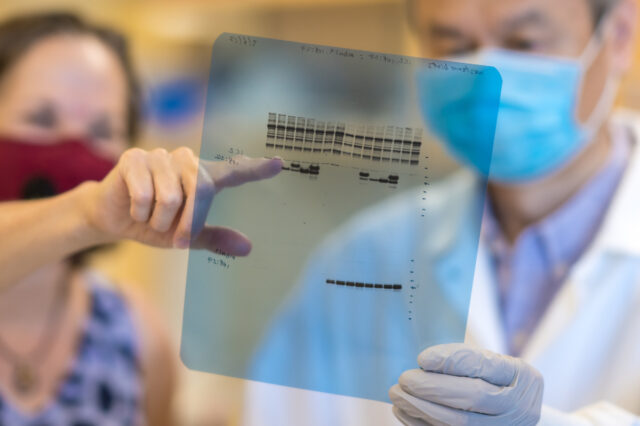Definition
Huntington disease (HD) is a genetic disorder in which nerve cells in certain parts of the brain waste away, or degenerate. The disease is passed down through families.
Alternative Names
Huntington chorea
Causes
HD is caused by a genetic defect on chromosome 4. The defect causes a part of DNA to occur many more times than it is supposed to. This defect is called a CAG repeat. Normally, this section of DNA is repeated 10 to 28 times. But in persons with HD, it is repeated 36 to 120 times.
As the gene is passed down through families, the number of repeats tends to get larger. The larger the number of repeats, the higher a person's chance of developing symptoms at an earlier age. Therefore, as the disease is passed along in families, symptoms develop at younger and younger ages.
There are two forms of HD:
- Adult-onset is the most common. Persons with this form usually develop symptoms in their mid-30s or 40s.
- Early-onset affects a small number of people and begins in childhood or the teens.
If one of your parents has HD, you have a 50% chance of getting the gene. If you get the gene from your parents, you can pass it on to your children, who will also have a 50% chance of getting the gene. If you do not get the gene from your parents, you cannot pass the gene on to your children.
Symptoms
Abnormal behaviors may occur before movement problems develop, and can include:
Abnormal and unusual movements include:
- Facial movements, including grimaces
- Head turning to shift eye position
- Quick, sudden, sometimes wild jerking movements of the arms, legs, face, and other body parts
- Slow, uncontrolled movements
- Unsteady gait, including "prancing" and wide walk
Abnormal movements can lead to falls.
Dementia that slowly gets worse, including:
- Disorientation or confusion
- Loss of judgment
- Loss of memory
- Personality changes
- Speech changes, such as pauses while talking
Additional symptoms that may be associated with this disease include:
- Anxiety, stress, and tension
- Difficulty swallowing
- Speech impairment
Symptoms in children:
- Rigidity
- Slow movements
- Tremor
Exams and Tests
The health care provider will perform a physical exam and may ask about the person's family history and symptoms. An exam of the nervous system will also be done.
Other tests that may show signs of Huntington disease include:
- Psychological testing
- Head CT or MRI scan
- PET (isotope) scan of the brain
Genetic testing is available to determine whether a person carries the gene for Huntington disease.
Treatment
There is no cure for HD. There is no known way to stop the disease from getting worse. The goal of treatment is to slow the symptoms and help the person function for as long as possible.
Medicines can be prescribed, depending on the symptoms.
- Dopamine blockers may help reduce abnormal behaviors and movements.
- Drugs such as amantadine and tetrabenazine are used to try to control extra movements.
Depression and suicide are common among persons with HD. It is important for caregivers to monitor for symptoms and seek medical help for the person right away.
As the disease progresses, the person will need assistance and supervision, and may eventually need 24-hour care.
Support Groups
More information and support for people with HD and their families can be found at:
Outlook (Prognosis)
HD causes disability that gets worse over time. People with HD usually die within 15 to 20 years. The cause of death is often infection. Suicide is also common.
It is important to realize that HD affects people differently. The number of CAG repeats may determine the severity of symptoms. People with few repeats may have mild abnormal movements later in life and slow disease progression. Those with a large number of repeats may be severely affected at a young age.
When to Contact a Medical Professional
Call your provider if you or a family member develops symptoms of HD.
If you or someone you know is thinking about suicide, call or text 988 or chat 988lifeline.org. You can also call 1-800-273-8255 (1-800-273-TALK). The 988 Suicide and Crisis Lifeline provides free and confidential support 24/7, anytime day or night.
You can also call 911 or the local emergency number or go to the hospital emergency room. DO NOT delay.
If someone you know has attempted suicide, call 911 or the local emergency number right away. DO NOT leave the person alone, even after you have called for help.
Prevention
Genetic counseling is advised if there is a family history of HD. Experts also recommend genetic counseling for couples with a family history of this disease who are considering having children.
References
Caron NS, Wright GEB, Hayden MR. Huntington disease. In: Adam MP, Ardinger HH, Pagon RA, et al, eds. GeneReviews. Seattle, WA: University of Washington. www.ncbi.nlm.nih.gov/books/NBK1305/. Updated June 11, 2020. Accessed June 22, 2021.
Jankovic J, Lang AE. Diagnosis and assessment of Parkinson disease and other movement disorders. In: Jankovic J, Mazziotta JC, Pomeroy SL, Newman NJ, eds. Bradley's and Daroff's Neurology in Clinical Practice. 8th ed. Philadelphia, PA: Elsevier; 2022:chap 24.
Last reviewed May 4, 2021 by Joseph V. Campellone, MD, Department of Neurology, Cooper Medical School at Rowan University, Camden, NJ. Review provided by VeriMed Healthcare Network. Also reviewed by David Zieve, MD, MHA, Medical Director, Brenda Conaway, Editorial Director, and the A.D.A.M. Editorial team..


